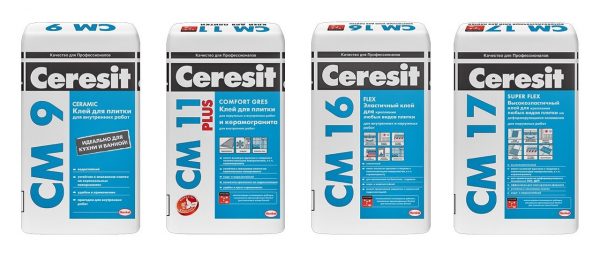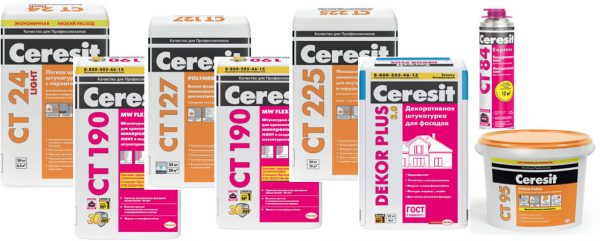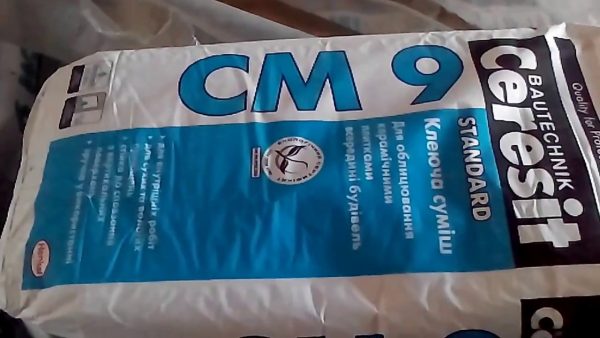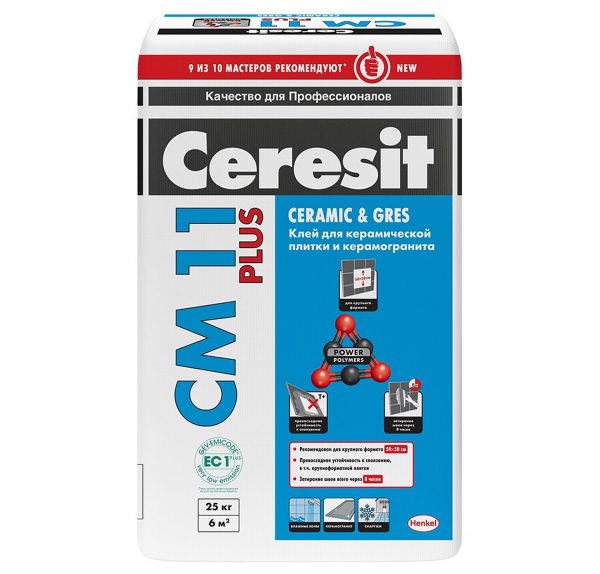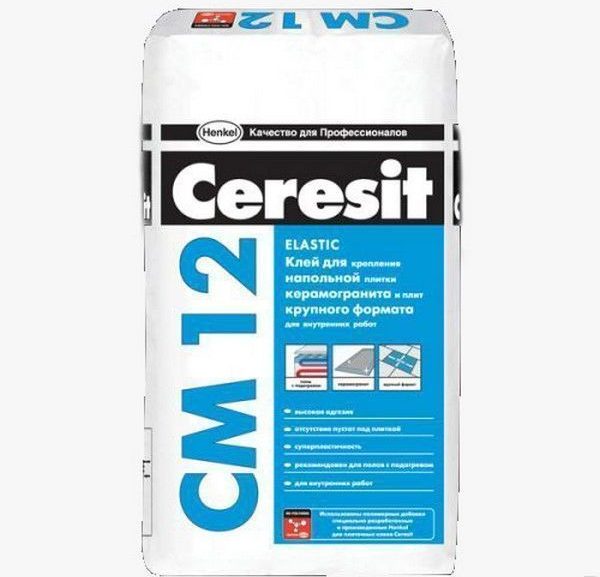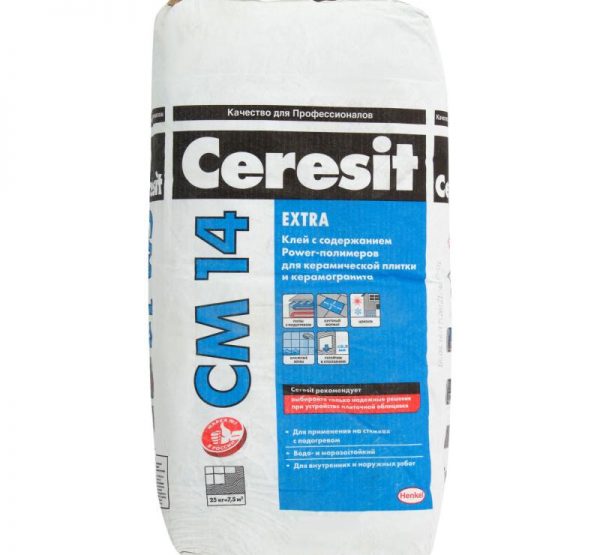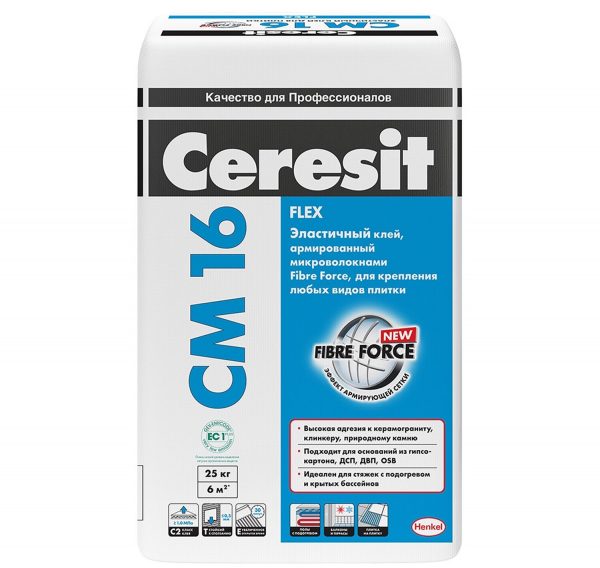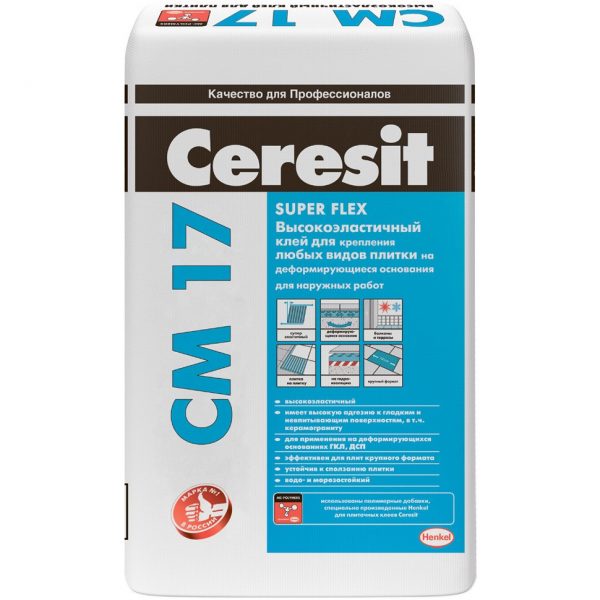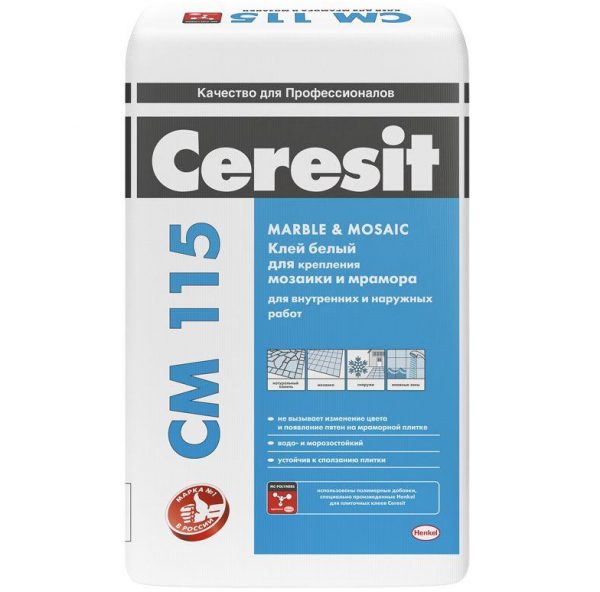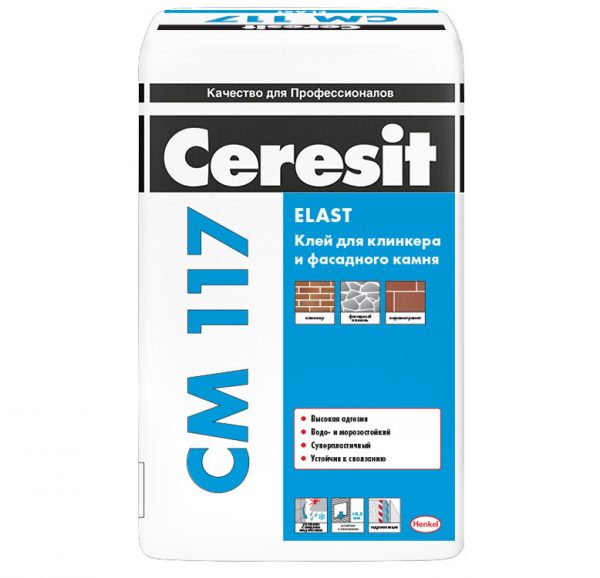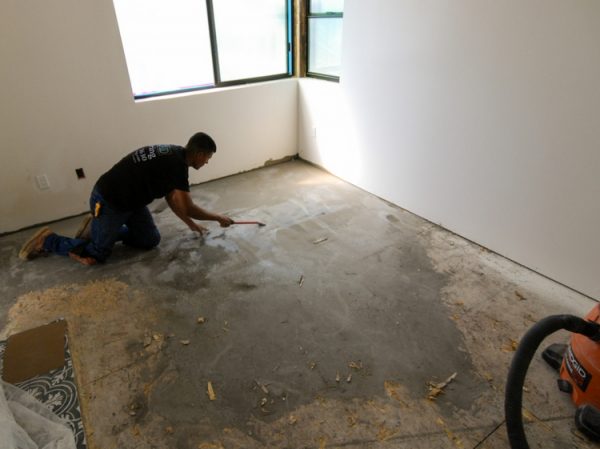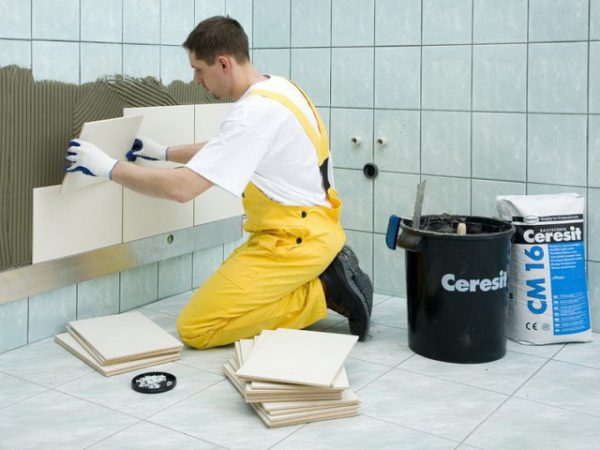When working with tiles, it is important to use high-quality tile glue. Different materials can be used for laying the material, depending on the type of tile and base. A good glue carefully fills the seams and provides a reliable adhesion of the finish to the surface. A whole line of adhesive compositions for tiles and porcelain tiles is produced under the brand name "Ceresit". There are waterproof and frost-resistant products, materials for underfloor heating and artistic ceramics. Tile glue "Ceresite" has a favorable price, because it is popular in construction and repair.
- Scope and variety of glues
- Types and specifications
- Ceresit CM 9
- Ceresit CM 11 Plus
- Ceresit CM 12
- Ceresit CM 14 Extra
- Ceresit CM16 Flex
- Ceresit CM 17
- Ceresit CM 115
- Ceresit CM 117
- Material consumption
- Preparation of the base and instructions for use

Scope and variety of glues
Ceresit dry building mixes are manufactured by Henkel and are used for exterior and interior use, for walls and floors, and various types of substrates. The range of tile adhesives is huge, there are universal and specialized tools on sale. All Ceresit compositions vary in scope, and for the convenience of determining the destination have the following markings:
- SM - building mixtures for fixing ceramic tiles;
- CB - adhesives for fragmentary repair of a lined surface;
- ST - mixes for installation of external (front) thermal insulation.
The purpose of the funds is different, the user can always find the right solution. Standard adhesives of the SM brand have high adhesion with brick, concrete, and are used for laying tiles, mosaics, porcelain tiles indoors and outdoors (for example, “Cerezit SM 110”). Some adhesives due to moisture resistance can be used in the bathroom, other wet rooms. Elastic adhesives will help to fix the finishing material on surfaces prone to vibration, shrinkage. There are also special adhesives of the SM series for:
- large-format floor tiles;
- mosaics and marble (white glues);
- clinker;
- front tile.
The CT line includes ready-made products and dry mixes for breeding for outdoor use. The most popular among builders are such compositions:
- CT 84 polyurethane adhesive for expanded polystyrene (used in the installation of external thermal insulation of facades);
- CT 190 stucco-adhesive mixture (CT190 is used for the installation of mineral wool boards and the base plaster layer for facade insulation);
- CT 85 stucco mixture for polystyrene boards (for indoor and outdoor use).
to contents ↑In the CB 10-100 series, acrylic and other mounting adhesives in cylinders are produced, with which they work indoors and outdoors. On all of these Ceresit adhesives, only tiles and heat-insulating materials can be fastened, and for laying other coatings it is necessary to choose specialized compounds (for example, UK 400 for PVC and linoleum). Each glue has a certificate of conformity, confirming its high quality.
Types and specifications
For tiled works, a series of SM adhesives from Ceresit is used. Most products are sold in 25 kg packages; some are also sold in small packages of 10 kg.
Ceresit CM 9
This material is one of the most inexpensive among analogues, it has an average degree of adhesion to the surface. It is used for gluing tiles, glazed tiles, terracottas up to 30 * 30 cm in size on the floor, walls. Glue Ceresit CM9 has sufficient moisture resistance, so it can be used in wet rooms.
Thanks to polymers and mineral constituents, the tool will reliably hold brickwork and can become a substitute for a standard cement mortar. For outdoor use it can not be used, it has low frost resistance. The glue works best on concrete substrates, it can also be applied on cement-lime, cement-sand plasters, aged for at least 28 days.
Specifications SM 9:
- packaging - 25 kg bags;
- the density of the dry mixture is 1.4 kg / cubic dm;
- tile sliding - up to 0.1 mm;
- adhesion - 0.5 MPa;
- temperatures during work - + 5 ... + 30 degrees, operation - 0 ... + 70 degrees;
- humidity during work - up to 60%;
- the viability of the solution is 2 hours;
- tile correction time -10 minutes;
- grouting period - 2 days.
Material consumption per 1 square. m depends on the size of the tile and the trowel tooth, it can be 2-4.2 kg / sq. m
to contents ↑Ceresit CM 11 Plus
The composition of Ceresit CM 11 Plus is considered a classic, it is most often used for laying tiles, porcelain stoneware in exterior and interior works. Glue includes a number of minerals and modifying additives, which provide a high degree of adhesion to various non-deformable substrates:
- concrete;
- cement coatings;
- cement-lime screeds;
- brickwork, etc.
CM 11 glue is suitable for stickers of any type of tile, except marble, measuring less than 50 * 50 cm on the floor and walls outside, inside buildings. It can also be used for laying porcelain stoneware for interior use. When adding special CC 83 elasticizer, the tool can be used for installation of waterproofing coatings, underfloor heating, plinths, external stairs and various deformable substrates - drywall, chipboard. In addition, the introduction of an elasticizer improves the properties of the adhesive and its use for gypsum, aerated concrete, paint coatings.
The characteristics of CM11 glue are as follows:
- consumption of 1 m2 - 1.7-55 kg / sq. m (depending on the size of the tile, trowel teeth);
- the viability of the solution is 2 hours;
- adjustment time - 20 minutes;
- the readiness of the tile for grouting - 72 hours;
- tile sliding - up to 0.5 mm;
- adhesion - 1 MPa;
- the temperature of application of the solution is + 5 ... + 30 degrees, operation - -50 ... + 70 degrees.
to contents ↑The glue is frost-resistant - it easily withstands 100 cycles of freezing / thawing. Also, the product is considered waterproof and can be applied to the walls, the bottom of the pools (after the introduction of an elasticizer).
Ceresit CM 12
Glue "Ceresit SM 12 Porcelain tile" is a specialized composition for fixing large-format floor tiles. It reliably holds slabs up to 60 * 60 cm in size, while it is suitable only for non-deformable substrates - concrete, cement screed. In humid areas, the composition can be applied in conjunction with waterproofing CR 65. The product has a plastic texture, prevents the appearance of voids under the tiles, has a high degree of adhesion to the base. CM12 glue is suitable only for internal work.
After the introduction of the CC83 elasticizer, the field of operation of the composition is expanding significantly. It can be applied on such surfaces:
- heated screeds;
- old tiles;
- concrete from the age of a month ("young concrete");
- gypsum, anhydride screeds;
- OSB boards, drywall, chipboard.
The product has low frost resistance - up to -30 degrees, therefore it is not used in freezing rooms, outside buildings. Tile adjustment time when applying CM 12 is increased to 30 minutes, the pot life of the solution is 2 hours. Other characteristics:
- tile sliding - up to 0.5 mm;
- the period before grouting - 48 hours;
- adhesion - 1 MPa.
The material flow calculator also depends on the size of the boards. If the size of individual elements does not exceed 30 * 30 cm, about 4.2 kg / sq. Is spent. m of glue. On laying tiles 60 * 60 cm, about 6 kg of mixture / sq. m
to contents ↑Ceresit CM 14 Extra
The product marked “Extra” - is frost-resistant, moisture-resistant, does not allow tiles to slide, perfectly combined with underfloor heating systems and waterproofing.Glue is suitable for external, internal works. Special fibers give the composition greater strength and elasticity, reinforcing mesh increases the impact resistance of masonry. The scope of CM 14 is as follows:
- all types of ceramic tiles;
- slabs of artificial, natural stones;
- porcelain tile;
- cement based materials.
The glue is intended for non-deformable bases made of cement, concrete, it can be used in the bathroom and other wet rooms. How much does the material dry? The time to grout the tiles is only 24 hours. Other characteristics of "Ceresit SM 14":
- the pot life of the solution is 2 hours;
- temperature during work - + 5 ... + 30 degrees;
- adjustment time - 20 minutes;
- adhesion - 0.8 MPa;
- frost resistance - 100 cycles;
- operating temperatures - -30 ... + 70 degrees.
The material consumption is equal to 2.7-6 kg / sq. m, the first digit is for tiles smaller than 15 cm, the second for more than 45 cm.
to contents ↑Ceresit CM16 Flex
Glue "Ceresite SM 16" is also reinforced with Fiber Force microfibers, has increased elasticity, can be used for all types of tiles. It is resistant to deformation, therefore it is suitable for such bases as gypsum fiber, drywall, fiberboard, chipboard, OSB-plate. The building mix is combined with waterproofing materials, it is waterproof, frost-resistant, suitable for balconies, terraces, indoor pools. It can also be used for the installation of heated screeds, overlaid on top of the old tiled cladding.
The elasticity of the glue prevents the appearance of shearing stresses during deformations. The tool is characterized by increased open time - up to 25 minutes, the same amount is a possible period for adjusting the position of the elements. Parameters "Ceresite CM16":
- tile sliding - up to 0.5 mm;
- the possibility of grouting joints - after 24 hours;
- adhesion - 1 MPa;
- frost resistance - 100 cycles;
- consumption - 2-4.2 kg / sq. m
Ceresit CM 17
The superelastic glue “Ceresit SM 17” is a tool reinforced with Fiber Force microfibres and designed for all types of tiles. This dry building mix is the most resistant to deformation, has a high level of adhesion, and does not allow tiles to slide. CM17 glue is characterized by frost resistance, moisture resistance, suitable for facing the outer part of stoves, fireplaces, hamams that do not heat up more than +80 degrees. Features and technical parameters of glue:
- can be used on particleboard, drywall;
- suitable for work inside and out;
- compatible with waterproofing "Ceresit" CR 65-166, CL 51;
- suitable for underfloor heating, swimming pools;
- not used on marble;
- the density of the dry mixture is 1.25 kg / cubic dm, of the finished solution - 1.45 kg / cu. dm;
- adjustment time - 30 minutes;
- consumption time - 2 hours;
- tile sliding - less than 0.5 mm;
- the possibility of grouting joints - after 24 hours;
- adhesion - 1.3 MPa;
- operating temperatures - -50 ... + 80 degrees;
- frost resistance - 100 cycles.
“Cerezit SM 17” is produced in two versions: glue with standard and low dusting.
to contents ↑Ceresit CM 115
Glue for mosaics and marbles of the brand “Ceresite CM 115” has a white color, therefore it is perfect for all types of marble, different types of stone, light limestone, transparent mosaics, and glass plates. Such materials are attached to non-deformable substrates: aged concrete, cement plasters, etc. Work with glue can be carried out outdoors and indoors. The advantages of the tool are as follows:
- frost resistance, moisture resistance;
- resistance to tile slipping (up to 0.5 mm);
- suitability for heated screeds, rooms with constant humidity, balconies, terraces, pools, tanks;
- environmental Safety;
- lack of spots, fading on marble;
- the ability to stick tiles on any deformable materials after adding an elasticizer;
- compatibility with waterproofing.
They work with this glue at temperatures of + 5 ... + 30 degrees, coating operation is possible at -50 ... + 70 °. The adhesion of the composition is 0.8 MPa, the correction time of the tile is 25 minutes, the glue's pot life is 2 hours, and frost resistance is 100 cycles.
to contents ↑Ceresit CM 117
Glue "Ceresit SM 117" - a specialized tool for facade stone, clinker tiles.This building mixture is elastic, can withstand moisture and frost, has a good degree of adhesion. Adhesive is used inside and outside the premises, for the installation of underfloor heating. Using CM117, you can glue all types of mineral tiles, except marble, on non-deformable substrates. Most often, glue is used for decoration:
- balconies;
- terraces;
- indoor pools;
- socles;
- parapets;
- old tile coverings;
- acrylic oil coatings;
- cellular and "young" concrete.
Deformable substrates can be finished with such glue after the introduction of elasticizers. The viability of the solution is 2 hours, the adjustment time is 15 minutes. Sliding tiles takes place no more than 0.5 mm, adhesion is 1 MPa, frost resistance - 100 cycles. During operation, the product withstands temperatures of -50 ... + 70 degrees.
to contents ↑Material consumption
The average consumption of glues of the Ceresit SM line does not differ too much. Usually it is 2-6 kg / sq. m and depends on the dimensions of the tile itself, as well as the size of the trowel teeth. In addition to these factors, the qualifications of the contractor affect the consumption. Material costs are increased with a combined method of application (on tiles and on the base).
Preparation of the base and instructions for use
To tile reliably held on the surface, you need to provide it with optimal bearing capacity. It is important to remove all fragile areas, sand, completely clean from traces of paint and plaster. Then the irregularities must be leveled with plaster, let it dry completely before gluing the tiles (usually the process takes 3 days). The floors are leveled with a suitable floor mortar.
Also, all contaminants that potentially reduce the adhesion of the composition should be removed from the base:
- dust;
- mud;
- fat;
- bitumen;
- oil.
If the floor is cement screed, wait at least 28 days to reach a moisture content of 4%. Only then is the primer and tile laid. The bases from a tree are primed by special means for 1-2 times. Do the same with various plates, drywall. OSB boards, paint coatings are treated with rough sandpaper and dust free.
The norms for diluting glue and adding an elasticizer are indicated on the packaging, they must always be observed exactly depending on the type of glue “Cerezit”. Pour clean cold water into a bucket, pour the building mixture, mix with a mixer, a drill with a nozzle. After withstand a technological pause (7 minutes), allowing the mixture to mature. Then the mass is re-kneaded and used for its intended purpose.
To apply glue, use a notched trowel or a grater with square teeth. Trowel glue, put on the base, level with a spatula. Press the tile as hard as possible, repeat the work further, not forgetting the inter-tile seams. Butt laying is not allowed. When installing large-format objects, stone, during facade work, glue is applied to the surface of each tile and to the base. The thickness of the adhesive joint is 3 mm, it depends on the complexity of the work and the size of the tile.
Traces of glue from the front of the tile are removed immediately with a wet rag. After hardening, you will have to do mechanical cleaning. Grouting is carried out after the time recommended by the manufacturer. Do not allow the solution to come in contact with the skin or eyes. To do this, it is important to observe preventive measures, wear gloves, protective clothing and glasses. Compliance with all the tips guarantees an excellent result when working with tiles and other types of finishing materials.

